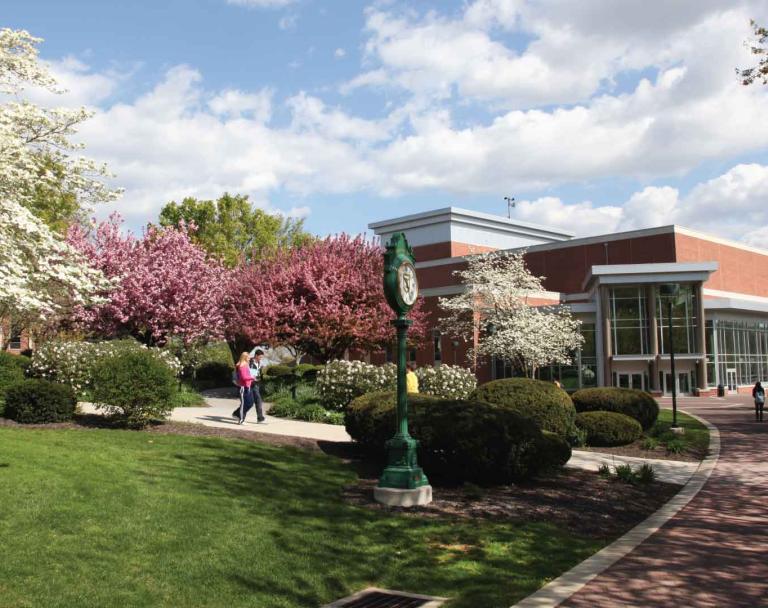Ukraine Panel Recap

- About Us
- Offices and Departments
- Center for Community Engagement
- Spotlights
- Ukraine Panel Recap
York College Experts Increase Awareness of Crisis in Ukraine During Virtual Panel
Associate Professor of Nursing, Klaudia Ćwiękała-LewisStudents and the general public searching for answers about the Ukrainian crisis attended a virtual seminar with three York College of Pennsylvania professors.
On March 23, the York College of Pennsylvania Center for Community Engagement and its Arthur J. Glatfelter Institute for Public Policy hosted a virtual panel—"The Crisis in Ukraine: Background and Geopolitical Implications”—to discuss the ongoing conflict in eastern Europe.
“In situations like this, there are a lot of emotions, and different stories are told in the press,” says Dominic DelliCarpini, Ph.D., Dean of the Center for Community Engagement, who planned the panel. “Part of our mission out of the Glatfelter Institute is to create a more informed population.”
Professor Charles Kauffman was one of three York College faculty members on the panel. A university student in the former Soviet Union, Kauffman has traveled in Russia following his retirement from government service. He has been teaching at York College since 2006 and is an Adjunct Professor of Russian Language and World Languages. He also spent more than three decades working as a language analyst and senior-level foreign affairs officer for the U.S. Government in Washington, D.C.
“The idea of doing that for the community was timely and an exemplary service provided by York College,” Kauffman says. “I've received positive feedback from individuals who watched as Zoom participants, and several have asked how to get the link for the recorded version. One person told me she wanted to send the link to friends in Germany who are concerned about the crisis.”
Associate Professor of Intelligence Analysis John Weaver was another panelist. “What I took away,” he says, “was that Putin really is isolated and didn't have a grasp of the complexity of such an operation before launching the invasion.”
Weaver has been working at York College since the Fall 2015 Semester. Before arriving at the College, he spent five years working for the intelligence community as a civilian in the Department of Defense and 20 years in the United States Army, retiring as a lieutenant colonel. Weaver spent the last six years of his Army career working at an operational level NATO headquarters in Europe.
The third panelist, Klaudia Ćwiękała-Lewis, Associate Professor of Nursing, was born and raised in Poland and is currently working with the State University of Applied Sciences in Włocławek, Poland, as part of the global engagement initiative at York College.
“The panel was a fantastic opportunity for our community to discuss the Russian invasion of Ukraine, including its historical, cultural, and socio-political dimensions,” Ćwiękała-Lewis says. “We also included a discussion of why war is considered a man-made disaster and humanitarian crisis as well as the best ways one can help.”
She and her students have been supporting and fundraising for Ukrainian refugees in Poland through her partnership with the Polish university.
The humanitarian crisis, Weaver adds, is probably one of the most significant ones he can remember. “It will really test the ability of western European countries to absorb the arrivals of refugees,” he says.
More informed and discerning citizens
DelliCarpini hopes panel attendees came away more informed. “Our main goal is that they now have a better understanding of the complexity and a more informed way to make decisions that is less emotional and more data driven,” he says.
Ćwiękała-Lewis’s biggest takeaway was that it is important to critically review the information provided by the media and realize that some of the information is based on opinion and not actual facts.
“Understanding the history and cultural and socio-political perspectives of Ukraine and Russia adds to the depth of the current crisis situation,” she says. “Ukraine has its own history, culture, language, nation, and territory, and most importantly, Ukraine is not a part of Russia.”
In his experience, Dean DelliCarpini has seen that in many cases, politics is viewed as either a game or something that is dirty. His hope, not just through this panel but through the Glatfelter Institute as a whole, is to build more informed and discerning citizens who see politics not as a bad thing but as a way that societies function.
“If we don’t have an informed populace, we don’t have a democracy,” he says. “When you make decisions, you have to have real information—not just listen to who is loudest.”
He hopes that York College will increasingly be seen as a source of valid, unbiased information where people know they’ll receive a trusted perspective on world events.
“This is the sort of community outreach York College does and should continue to do,” Kauffman says. “It drew upon unique backgrounds of panelists and was brought to the community through the expert assistance of the Information Technology Department at YCP.”

